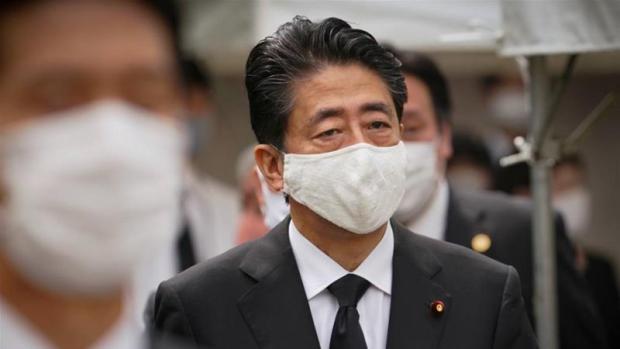More medical checks for Japan PM as health speculation grows
By Hiroshi Hiyama and Sara Hussein
TOKYO – Japan’s Prime Minister Shinzo Abe said Monday (24) he had undergone more medical tests but declined to provide details, a week after a first hospital visit that fuelled growing speculation about his health.
Abe cut short his first term in office in part because of crippling health problems linked to ulcerative colitis, an ailment he said he had overcome when he returned to power in 2012.
But in recent weeks, reports have suggested that the 65-year-old prime minister is ill again, with tabloids claiming he has been vomiting blood and even confidants publicly saying he needed rest.
Abe arrived back at his office on Monday afternoon after several hours at the hospital in Tokyo, but offered little detail on his condition.
“Today, I received detailed explanations about the results of the tests from last week, and I had additional tests,” he told reporters.
“By taking full care of my health, I would like to continue to work hard.”
He declined to be drawn further on the nature of the tests conducted last week or on Monday, but suggested he might speak publicly about them at “a later time”.
Earlier, Japanese government spokesman Yoshihide Suga downplayed speculation about Abe’s health.
“I see him every day and I don’t see any change in him,” he said.
When asked whether Abe would serve out his term through September 2021, Suga said: “The additional tests are being done to achieve that end.”
Even before his hospital visit last week, there were questions about whether Abe was sick, with commentators noting he has not held a full press conference in weeks despite rising criticism of the government’s handling of the coronavirus outbreak.
Abe’s health has haunted him in the past. In 2007, he resigned just a year into his first term as prime minister, citing health problems in part.
He was diagnosed with ulcerative colitis, an inflammatory bowel condition, and spent months being treated in hospital.
On his return to office in 2012, Abe said he had overcome the condition with the help of medication.
Analysts said it was too early yet to know whether Abe’s health problems could trigger political upheaval, but that there would now be growing pressure on him to explain the situation.
“It seems as if the government hoped that with a pause Abe might recover and therefore his condition would not become a political issue,” said Tobias Harris, a Japan expert at Teneo consultancy and author of a book on Abe.
“After his second unexpected hospital visit in as many weeks, I think that approach has run its course… it will be increasingly difficult for the government to avoid providing a more transparent account of Abe’s condition,” Harris told AFP.
The speculation about Abe’s health comes as he breaks the country’s record for the longest consecutive term as prime minister.
He was already the country’s longest-serving prime minister, counting his first and second terms in office.
But as of Monday, he has been in power for 2,799 uninterrupted days, breaking the record previously set by his great uncle Eisaku Sato.
The record is unlikely to provide much immediate solace for Abe, who in addition to his health woes faces plummeting support from a public that has been highly critical of his handling of the coronavirus.
A poll published Sunday (23) by the Kyodo news agency found the approval rating for his cabinet stands at 36%, the second lowest-since he returned to office in 2012.
The survey conducted over the weekend found 58.4% were unhappy with the government’s handling of the virus.
While Japan has seen a comparatively small outbreak — with nearly 62,000 infections and close to 1,200 deaths — Abe has been slammed for his economic response as well as a widely mocked program to distribute reusable cloth face masks.
Harris said the prime minister’s ruling Liberal Democratic Party would “absolutely prefer to avoid the chaos that could follow a resignation” with no clear consensus yet on a successor to Abe.
-Agence France-Presse


